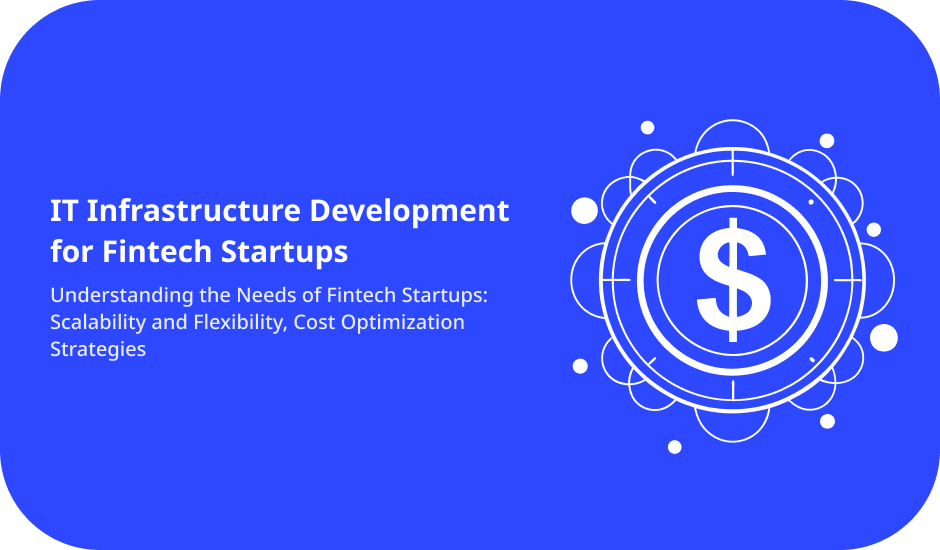
Fintech startups are creative companies that are transforming the financial industry. They use technology to create new and improved financial services, making them more accessible, convenient, and affordable. These startups are shaking things up by offering everything from mobile payments to digital investing, focusing on a user-friendly experience.
But building a successful fintech startup requires more than just a great idea. A robust Information Technology (IT) infrastructure is essential for their success. This refers to the underlying technology that powers everything a startup does, from its website and mobile app to its data storage and security systems. Just like a strong foundation is essential for a building, a robust IT infrastructure is vital for a fintech startup to thrive.
Let’s explore the critical components of a robust IT infrastructure for fintech startups and see how important it is to have IT infrastructure as a startup!
Understanding the Needs of Fintech Startups
Fintech startups face unique challenges when it comes to IT infrastructure. Unlike traditional financial institutions, they need their systems to be scaleable. As a startup grows, its user base and data will explode. The IT infrastructure needs to adapt seamlessly to handle this increasing demand. Their IT infrastructure should be adaptable to accommodate these changes quickly and efficiently. Finally, they must be able to protect sensitive financial data, which is leading. Below, we listed some key components a Fintech startupmust have to build a successful company.
Are you looking for innovative Fintech startup solutions or need consultation? Feel free to contact us.
Cloud Solutions for Fintech Startups
Cloud computing offers the perfect solution for fintech startups. It is like renting your IT infrastructure's building blocks, like storage and servers, from a cloud provider instead of buying expensive equipment directly. This is called Infrastructure as a Service (IaaS). It gives startups flexibility and avoids upfront hardware costs.
But cloud computing offers even more. Platform as a Service (PaaS) provides a complete development platform on the cloud. Startups can focus on building their applications without worrying about managing the underlying infrastructure. Think of it as having a pre-built development environment ready to go!
There's also Software as a Service (SaaS). This gives you access to pre-built software applications like customer relationship management (CRM) or accounting tools directly through the cloud. This is a cost-effective way to get essential functionality without managing separate software licenses.
Benefits of having Cloud services:
● Pay-as-you-go models eliminate the need for expensive upfront investments in hardware and software.
● Quickly scale resources up or down as your business grows. No need to worry about buying more equipment!
● Quick and easy to deploy, allowing startups to focus on core business activities.
Key Cybersecurity Measures
Fintech companies work with private financial information, so ensuring their base is safe and well-organized is crucial for their success. This starts with solid security steps to keep your data secure. Think of your devices as individual castles protected by endpoint security solutions. These solutions act as walls against malware and unauthorized access.
Firewalls and attacker detection systems protect your network. For even more protection, data encryption scrambles private data so that it can't be read even if there is a data breach. It's like a secret code that keeps your goods safe. Lastly, strict entry controls ensure that only allowed people can enter certain parts of the castle. This is similar to controlling who can get into different data sets.
Data Management
Data handling that works well is another crucial factor for growth and cybersecurity. This is precisely what backup and storage solutions for data do. But protecting data isn't enough; you must also know how to use it well. It's easy to find what you need with database management tools that help you organize and keep track of this data. Lastly, business intelligence and data analytics tools are like powerful treasure maps that help you find valuable insights in your data. Reviewing this data, you can make smart business choices and move your fintech startup forward.
Fintech startups can build a strong base for safe, scalable, and data-driven success by giving these things careful thought. This strong base will allow their cutting-edge financial services to reach their full potential and change how we handle our money.
Scalability and Flexibility
Building a solid foundation is crucial for any fintech startup. Cloud platforms with on-demand resources and microservices architecture (think building blocks for your app). They allow you to scale up or down quickly and add new features without disrupting everything else. Containerization tools like Kubernetes package your app neatly, ensuring consistent performance. By embracing these technologies, you'll save money, innovate faster, and be prepared for whatever the future of fintech throws your way.
Compliance and Regulatory Considerations
Regulations like GDPR (General Data Protection Regulation) prescribe how you collect, store, and use customer data. Industry standards and best practices, like PCI DSS (Payment Card Industry Data Security Standard), provide additional guidelines for safeguarding sensitive information. Finally, regular security audits and assessments are essential to identify and address vulnerabilities in your system. By prioritizing compliance, you build trust with your users and avoid costly penalties.
Cost Optimization Strategies
Building a solid IT foundation is crucial for fintech startups, but it doesn't have to break the bank. Cloud platforms with usage-based pricing let you scale resources up or down as needed, eliminating wasted spending. Once in the cloud, optimize and automate tasks to squeeze the most out of your resources. Plus, consider open-source software – it's often free and as powerful as paid options. Combining these cost-conscious strategies allows you to build a secure and scalable IT infrastructure that fuels your growth without emptying your wallet.
Case Studies and Examples of IT Infrastructure in FinTech
Chime, the popular mobile banking app, leverages the cloud for scalability and robust security, allowing it to serve millions efficiently. Similarly, Nubank, Latin America's leading digital bank, thrives on a cloud-native architecture. Their focus on automation and CI/CD (continuous integration/continuous delivery) fuels their rapid development and deployment cycles.
These success stories showcase the importance of starting cloud-native from the get-go, building agility through microservices and containerization, prioritizing security from the beginning, and constantly optimizing for efficiency through cloud features and automation.
Conclusion:
Remember, a robust IT infrastructure is the foundation of long-term success. But building it can be complex. That's where we come in. BMP Global specializes in services that are provided for fintech startups, including implementing them secure, scalable IT infrastructure solutions specifically designed for the unique needs of fintech startups. You can have it SaaS or on-premise.
Ready to unlock the full potential of your fintech startup? Contact us today for a free consultation and see how we help you to implement IT infrastructure that boosts your growth.













